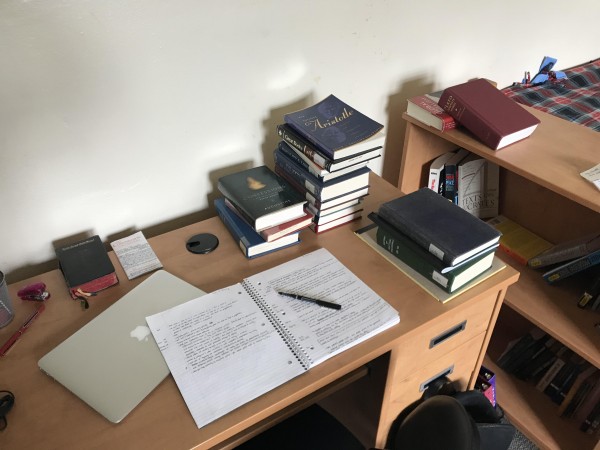Hitting the Books

I love homework. It’s a given that we work hard at Kenyon, but what isn’t as obvious is that we want to work hard.
Of course, I didn’t always love homework. Back in high school, I resented many of my assignments; oftentimes, the work was uninteresting to me or felt pointless. Other than this or that complaint about an overlong chemistry problem set, my friends and I didn’t talk much about our work or what we were learning. But I found my approach to school transformed by Kenyon’s intellectual environment.
Instead of speeding through textbooks and worksheets, at Kenyon I peruse academic journals, explore scholarly commentary and linger over the great books. Rather than read passively, I’m asked to actively form my own opinions and discuss them with my peers. What’s more, I’ve found that my opinions are increasingly well-informed, that I understand the reading and the debate in which it is situated.
Assignments at Kenyon become opportunities not only to (hopefully) earn a high grade, but to produce something thoughtful or even insightful, to immerse myself in a subject, and to have some fun. Though, of course, some essays are of familiar form, I often find that I’m doing something completely new.
In my first-year “Quest for Justice” class, I wrote a dialogue among God, Marx and Nietzsche, replete with jokes and a twist ending; last semester, I spent weeks obsessing over an analysis of the security of the Baltic region re: Russia. I cared deeply about these and other assignments simply because the work was of a type I’d never gotten the chance to do. After a few semesters, three to five pages became 15 to 20.
As I walk around the library, as I listen to conversations in Peirce, I see my peers reading together and hear them discussing everything under the sun. In such a communal learning environment, we recognize each other’s hard work and take pride in others’ successes. We recognize that in any given group of Kenyon students, each can contribute to our understanding of an issue in their own unique way.
For example, as a theory-inclined political science major, I gravitate toward reading Plato, Aristotle, Machiavelli and Hegel. Yet, true to the liberal arts ethos, at the behest of my friends majoring in studio art, philosophy and math, I’ve also read Chekhov, listened to the Islamic call to prayer and saw “Rosencrantz and Guildenstern Are Dead” performed on Kenyon’s mainstage.
Even as I write this on a sleepy Saturday morning, there are folks here in the library already, happily hard at work. They’ve been urged from their repose by that “strange spell,” that tangible verve, that Kenyon air. It’s through meaningful work that we write and find our voices, read and discover our passions, and debate and clarify what we believe. The satisfaction we find at the end of the semester is not merely the sigh of relief at labors completed, but a reflective pleasure in our personal and intellectual growth. We realize how much we’ve learned as students, how much we’ve grown as people, and how much knowledge and life can be learned and lived in 14 too-short weeks.
